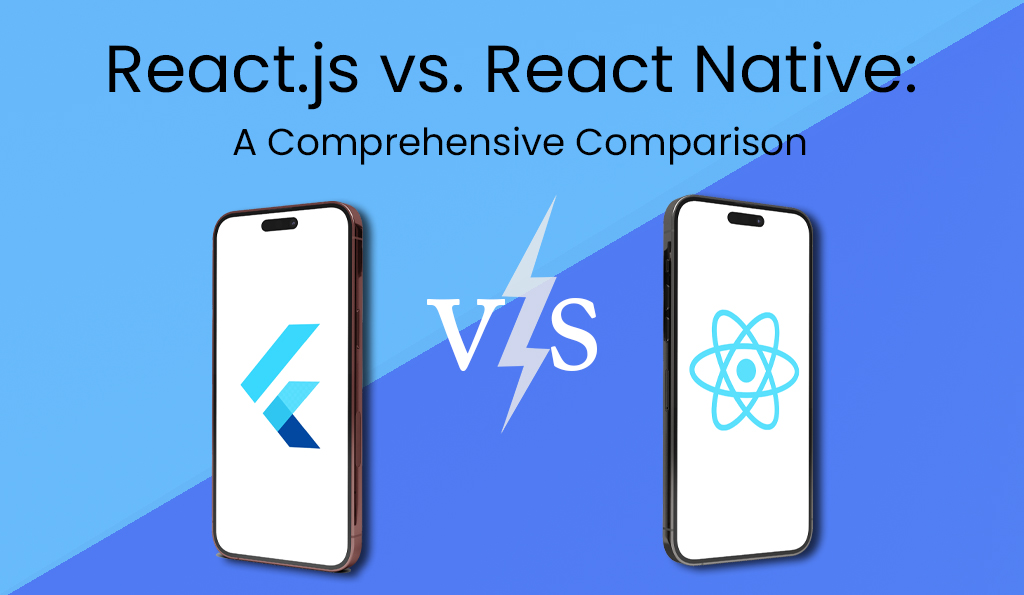Reactjs vs. React Native: In the ever-changing world of web and mobile creation, React.js and React Native have become two of the most well-known and effective frameworks. React.js (often known by its initials React) along with React Native Both are products from Facebook created to simplify the process of creating user interfaces. React.js is mostly used to develop web applications, whereas React Native focuses on mobile application development. This approaches an ideal time to make a thorough review of these two technologies to assist companies and developers make informed decisions.
Introduction to Reactjs vs. React Native
Before getting into the specifics of Reactjs vs. React Native differences, let’s describe React.js and React Native.
-
React.js (React)
React.js is a JavaScript library that allows users to create user interfaces for web-based applications. It was created by Facebook and was released as an open-source software in 2013. The primary objective of React is to offer a flexible and effective method of creating interactive and interactive user interfaces. It is typically employed alongside other technologies such as Redux to handle state.
-
React Native
React Native is an open source framework that allows you to build mobile apps that utilize JavaScript as well as React. It was also created by Facebook and launched in the year 2015. React Native lets developers create code in one go and then implement it on different platforms, like iOS and Android as well as providing an experience that is native-like.
Related Article: Reactjs vs React Native : A Complete Guide
Development Environment and Tools of Reactjs vs. React Native
React.js:
- The process of developing using React.js typically involves the creation of an environment for development, which includes tools such as Node.js and the npm (Node Package Manager), and a code editor such as Visual Studio Code.
- Component-Based Design: React.js follows a modular design that allows developers to build reusable UI components. This encourages an approach to development that is modular.
- UI Libraries: React.js is often utilized in conjunction with UI libraries such as Material-UI, Ant Design or Bootstrap for creating visually appealing and responsive web interfaces.
React Native:
- Developer Environment: The process of developing using React Native also involves setting the development environment that includes Node.js and NPM. In addition, developers require platform-specific tools, for instance Xcode to support iOS development, and Android Studio in Android development.
- Native Modules: React Native allows the integration of native modules if required. This allows developers to leverage platforms-specific code to perform specific functions.
- 3rd-Party Libraries: React Native offers an array of third-party libraries and applications that make it easier for the addition of complex features to mobile apps.
User Interface of Reactjs vs. React Native
React.js:
- Web-Based User Interface: React.js is exclusively developed to develop web applications and is restricted to the creation of Web-based User Interfaces.
- Web Components: React.js components render HTML elements and permit the development of web-based interfaces that are rich. However, these interfaces might not offer a native look and feel for mobile devices.
- Responsive Design The creation of responsive web applications is a standard method using React.js making sure that the UI is able to adapt to various screen sizes.
React Native:
- Native Mobile User Interface: React Native is a leader in constructing native-looking user interfaces for mobile applications. It lets developers use native components, leading to a natural look and feel that works on each of iOS as well as Android.
- Platform-specific UI: React Native lets you design platforms-specific UI components if needed and ensures that the app conforms to the guidelines for design for each platform.
- Performance Because React Native converts native codes, it usually provides better performance than web-based mobile frameworks.
Code Reusability of Reactjs vs. React Native
React.js:
- Limited Reusability of Code: React.js is primarily intended to be used for web development. Although some of the code and logic could be reused in different web-based projects, it can’t be directly converted to mobile apps.
- web-only: React.js code is not compatible with React Native. Developers must rewrite the codebase in order to switch from mobile to web.
React Native:
- High-Code Reusability React Native was created with reusability of code in the back of our minds. A large portion of the code is transferred between iOS or Android applications, thus reducing the development time and effort.
- A Single Codebase React Native lets developers maintain a single codebase that is compatible with each of iOS and Android applications, making it easier to manage maintenance and updates.
Performance of Reactjs vs. React Native
React.js:
- Web Performance: React.js is optimized for web performance and excels at rendering dynamic web interfaces in a speedy manner.
- Virtual DOM: React.js uses the virtual DOM to make updates more efficient by reducing the amount of real DOM manipulations, and improving overall performance.
React Native:
- Native performance React Native applications usually provide superior performance than hybrid frameworks because they can be compiled using native code.
- GPU Acceleration React Native is able to support GPU acceleration which is useful in applications that need graphics to be performed.

Access to Native Features of Reactjs vs. React Native
React.js:
- limited native access: React.js primarily focuses on web development but does not provide an access point to features native to devices or APIs.
React Native:
- Native access: React Native offers an extensive set of native APIs and features of devices via libraries and modules. Developers can develop mobile applications that are feature-rich and have access to features specific to devices.
- Community Modules It is the React Native Community that has created many native modules, making it easier to incorporate specific capabilities of devices into apps.
Development Community and Ecosystem of Reactjs vs. React Native
React.js:
- Mature Ecosystem: React.js has a robust and established ecosystem that is well-established with an extensive developer community. This leads to a myriad of tutorials, libraries and other third party software and other resources.
- Continuous Enhancement: React.js continues to develop, through regular changes and improvements pushed by Facebook and the community of open-source developers.
React Native:
- The Ecosystem is Growing: The ecosystem of React Native has exploded since its beginning, with an active community of developers helping to expand its reach.
- Stability: React Native has experienced significant improvements in stability over time which makes it a reliable option for mobile application development.
Development Speed and Productivity of Reactjs vs. React Native
React.js:
- Speedy development: React.js enables rapid web development by encouraging reuse of components and by providing tools to manage the state of the UI.
- codebase consistency: Keeping a consistent codebase can be a challenge with React.js in conjunction with other technologies, such as Redux. But, this isn’t an issue with simple projects.
React Native:
- Accelerated development: React Native accelerates mobile app development because it allows developers to reuse code and use the same codebase across different platforms.
- Hot Reloading: React Native allows hot reloading, which enables developers to immediately see the impact of changes to code in the course of development.

Popularity and Industry Adoption of Reactjs vs. React Native
React.js:
- Widespread Acceptance: React.js is widely used in the development of websites and tech companies and startups using it to build web-based applications.
- A Large Talent Pool There’s a huge pool of React.js developers in jobs, which makes it easier for companies to locate skilled professionals.
React Native:
- growing in popularity: React Native has gained attention in the world of mobile app development due to its code reuse and performance advantages.
- The demand of React Native Developers: As the demand for mobile application development continues to increase so does the demand of React Native developers is also increasing.
Community Support and Maintenance of Reactjs vs. React Native
React.js:
- Active Communities: React.js has an active and involved community that contributes regularly to the library’s growth, and ensures its continued existence.
- Long-Term support: React.js benefits from long-term support and the commitment of Facebook to keep it up and running. it.
React Native:
- Community-driven React Native’s community is a key factor in its development. numerous issues and features are influenced by the community.
- official support: Facebook provides official support for React Native, ensuring that it will remain an option to develop mobile apps.
Learning Curve
React.js:
- Moderate Learning Curve: React.js has a moderate learning curve, particularly for developers who are comfortable using JavaScript as well as HTML.
- State Management Management of application state particularly in large applications, is often a challenge and requires libraries such as Redux.
React Native:
- JavaScript Experience Developers who have JavaScript know-how can switch from HTML0 to React Native relatively easily.
- Platform Specific Code: Learning the specific code for your platform to work on iOS and Android could be difficult for novices, however it’s crucial to optimize your user’s experience.
Debugging and Testing
React.js:
- Debugging tools: React.js benefits from various debugging tools and extensions in all popular browsers.
- testing: React.js applications can be tested using libraries such as Jest and Enzyme that are extensively used within the JavaScript community.
React Native:
- Debugging Problems Debugging React Native applications can be more difficult, especially when you have to deal with issues that are specific to a particular platform. However, tools like React Native Debugger can help.
- Testing React Native applications can be tested with Jest and other similar JavaScript Testing libraries.
Deployment and Distribution
React.js:
- Web deployment: React.js applications are developed as web-based applications that can be hosted on different platforms including cloud providers as well as web servers.
- browser compatibility Developers should take into account compatibility with browsers when developing React.js applications.
React Native:
- React Native apps are available via App Stores from Apple’s App Store as well as the Google Play Store, making it simple to reach out to a broad public.
- Over-the-air Updates: React Native supports over-the-air updates that allow for the seamless updating of mobile apps, without the need for users to download the latest version through the app store for apps.
Use Cases
React.js:
- Web Application: React.js is ideal to build web applications that are responsive and dynamic that range from simple websites to more complex web-based platforms.
- Single Page Applications (SPAs): React.js is widely used to build SPAs that provide users with a seamless and enjoyable experience.
React Native:
- Mobile Applications React Native is the best choice to create cross-platform mobile applications which require native-like performance as well as user interfaces.
- Prototyping React Native could be an effective tool to quickly prototype mobile app concepts and ideas.
In the year 2023 React.js along with React Native remain powerful tools for mobile and web application development and mobile app development, respectively. The choice of which one to use is based on the requirements of your project and the expertise of your development team and the platform you’re targeting.

React.js is the preferred option for web development. It has an established ecosystem, a large developer community and a flexible component-based architecture. It is a master at creating websites that are responsive and is widely utilized across the entire industry.
React Native however, on contrary, is a shining star in the field of mobile application development. It allows you to develop native-looking mobile apps with high reusability of code, resulting in a shorter development time and costs. The performance advantages and the ability to access native features make it a great option for mobile development that is cross-platform.
In the end, the choice between React.js vs. React Native depends on your specific needs and objectives for your project. In certain cases, combining both technologies with an “React.js for web and React Native for mobile” strategy could be the best approach to provide a consistent user experience across various platforms.
iTechnolabs is a React Development Company having both Reactjs and React native developers, who have extensive experience. You may hire dedicated developers from iTechnolabs or share the custom project requirements with team.






